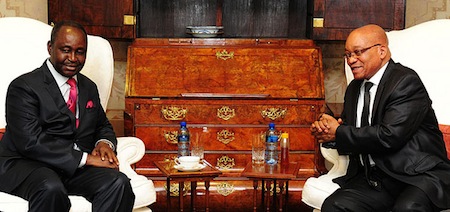For the past two weeks, while Nelson Mandela, South Africa’s legendary first post-apartheid president battled pneumonia, at age 94, in a Pretoria hospital, the successors of his political inheritance have squandered yet a bit more of the moral power Mandela bequeathed to them.![]()
![]()
It’s not the first time that South African president Jacob Zuma and the current iteration of the governing African National Congress (ANC) have failed to live up to the larger-than-life image of Mandela, but the death of 13 South Africans troops (or quite possibly more) in the Central African Republic, along with 27 additional injured soldiers, out of a contingent of around 200 that came to Bangui in January, has come to a shock to South Africans — the action was South Africa’s deadliest since clashes resulting from the end of minority rule in 1994. The deaths occurred in late March when the Séléka rebel coalition ousted current president François Bozizé (pictured below, left, in happier times with Zuma) from office, bringing to an abrupt end a short-lived January ceasefire between the Bozizé government and rebels.
South Africans, moreover, aren’t used to seeing dead South African soldiers in bodybags, not least of which resulted from the defense of an autocratic president — who took power himself in a 2003 coup — against another group of rebels in a small, landlocked central African nation half a continent away.
So Zuma’s announcement this week that South African troops would withdraw from the Central African Republic entirely has been welcome news, but South Africans are still asking asking pointed questions about why South African troops were defending François Bozizé’s regime by fighting against a rebel force that included, in part, child soldiers. Defense minister Nosiviwe Mapisa-Nqakula last weekend rejected critics by mockingly asking if the troops should give sweets and blow kisses to the child rebels.
The truth seems to be that the troops were defending cozy contracts between the Bozizé administration and South African businesses, including top ANC leaders. Zuma’s story has already changed since January: first, the troops were part of a training mission, then they were part of a security contingent to protect the trainers.
At a memorial earlier this week for the fallen troops, Zuma struck out at his critics in some fairly unsettling terms that indicated he didn’t want any further public discussion of the matter:
“The problem in South Africa is that everybody wants to run the country,” [Zuma] told a memorial service for the 13 soldiers killed in the Central African Republic (CAR) last week.
“There must also be an appreciation that military matters and decisions are not matters that are discussed in public, other than to share broader policy.”
The resulting furor has been an incredible embarrassment for South Africa — in diplomatic, political and military terms alike — drawing considerable international criticism:
On the other hand the presence of South African troops in the CAR is less nuanced and could also be termed neo-colonial, although with far less diplomatic finesse. It did not carry a comprehensive African Union (AU), let alone UN mandate. The intervention was badly managed, improperly considered and appears ill-fated. It can be argued that the role of SANDF troops in CAR indicates a dangerous shift by South Africa towards supporting illegitimate regimes in order to protect economic interests with strong links to powerful domestic political networks. The presence may have been legal but was it morally defensible?
Not only did Zuma send troops to defend an unpopular autocrat, but he did so when no other foreign national forces were willing to defend the same autocrat, and it appears he did so largely to protect the economic interests of top ANC officials — to make things worse, South Africa didn’t even succeed in saving Bozizé’s regime. So Zuma has to answer to the rest of the African Union just what South African troops were doing in Bangui and why they engaged so fiercely to protect Bozizé, all the while leaving South Africa with even less political, diplomatic, and military power to project in the future:
It is of further concern that South Africa, with its erstwhile moral cachet, has so badly abused its self-appointed role as a regional superpower. This is especially so given its inability to decisively project this power militarily. While South Africa has leveraged its powerful economy throughout the region, projecting itself as an economic gateway into Africa, it lacks the military logistical reach and clout to underpin its bold economic projection.
But even South Africa’s longtime role as the economic engine of sub-Saharan Africa is also under siege as ‘cheetah’ economies like Ghana and Angola notch higher GDP growth rates on the basis of mineral and oil wealth — Nigeria, for example, is on course to overtake South Africa — maybe sooner, maybe later — as the continent’s largest economy.
Nonetheless, Zuma was attending a largely regional summit in N’Djamena, the capital of Chad, this week, still trying to protect murky South African interests:
Exactly what Zuma’s objectives are in attending this summit is unclear. What is almost certain, however, is that despite calling the Séléka rebels, who ousted Bozizé, bandits, Zuma will want to reach some sort of understanding with the powers in Bangui not only to protect whatever South African assets remain in the country but, more importantly, to ensure that those assets remain South African. In his inaugural speech in Bangui last weekend, Michel Djotodia, the self-proclaimed president, announced that he would be taking a close look at all business deals the previous regime had entered into. It’s no secret that Djotodia was referring to Bozizé’s mining agreements with the South Africans, the French and the Chinese.
Meanwhile, back home, the Mail & Guardian has been tenacious in its reporting on the blowback and the government’s increasing obfuscation to answering basic questions about the tragedy — the paper ran a front-page cover showing a flag-draped casket with the word ‘Humiliation’ on the front page.
Photo credit to AFP-JIJI.

